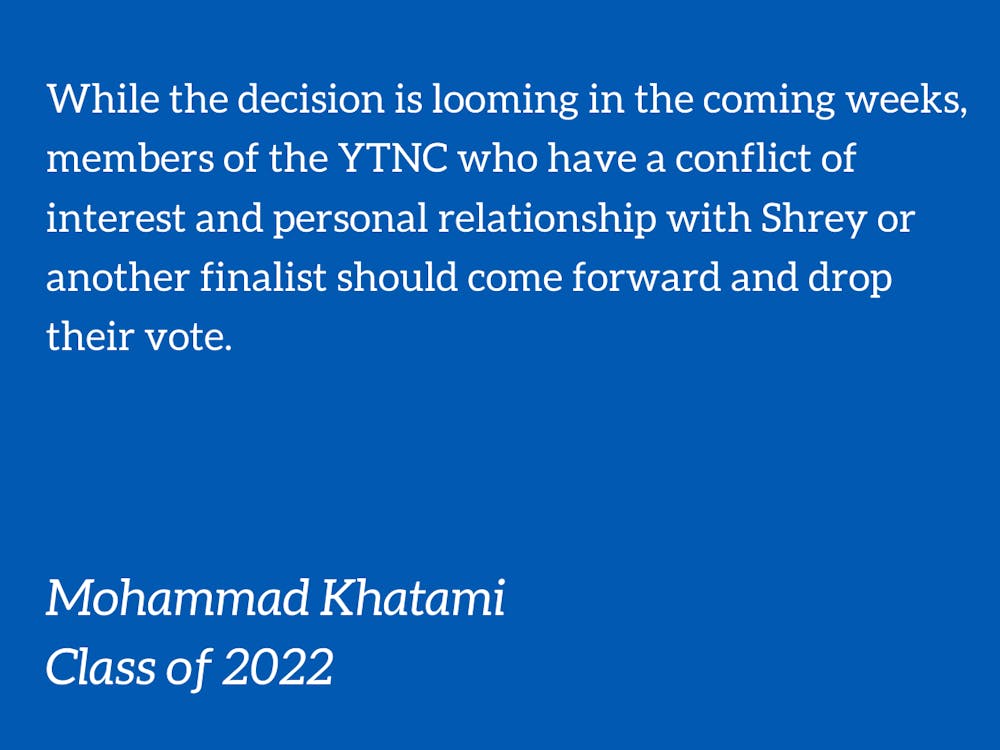The Young Trustee selection process has changed a lot since its inception.
As you may know, the Young Trustee is a position granted to two students each year, one from the Undergraduate community and the other from the Graduate & Professional community. This individual serves on the Duke University Board of Trustees, typically with an observational period and then a year or two as a full voting member of the Board.
This position is incredibly powerful, helping make decisions at the highest levels of Duke’s administration and governance to maintain the long-term health of the University.
The process for filling this coveted position was previously a student-body election, but today we have the Young Trustee Nominating Committee (YTNC), a group of student leaders who participate in selecting the next YT by submitting a formal recommendation for the position to Duke’s president.
If you don’t know much about the YTNC, you’re not alone. What used to be a democratic process has now become a kangaroo court where nominations are won by the candidates with the most connections to YTNC members. Appeal to the student body is meaningless.
Want to be the Young Trustee? It’s simple! Get your friends to apply to be on the YTNC, apply to be the YT yourself and prepare a LinkedIn post about how grateful you are to be the new YT.
With the open knowledge available on this year’s proceedings, I can assert that finalist Shrey Majmudar has taken multiple steps to unfairly increase the likelihood of his nomination compared to other finalists.
He served on the YTNC for two years, including one year as the chair (yes, chair of the committee that just nominated him). This means he has spent over half of his time at Duke familiarizing himself with the types of questions asked by the YTNC in the application and interviewing phase. Shrey also has profoundly personal connections to members of the YTNC which other finalists do not. He serves as the DSG Chief-of-Staff for Christina Wang. He is roommates with Nitin Subramanian. He is future co-workers with Kamran Kara-Pabani. He served on the executive board of DSG alongside Ramya Ginjupalli and Jake Jeffries when he was Vice President of Academic Affairs. While he was Chair of the YTNC, he also served alongside current YTNC Chair, Alexis Williamson. And he also served on the campaign of Trey Walk, a current YT and member of the YTNC.
This past week, a town hall was held with the undergraduate YT finalists, and at the beginning of this meeting, it was noted that the YTNC undergoes bias training and a conflict of interest briefing before reviewing applications for the YT. It was also mentioned that key information like names, phone numbers and emails were removed from the YT applications before review by the YTNC.
But these measures are useless. Removing “key identifying information” doesn’t stop someone from identifying their friend’s application. If we see “DSG Chief-of-Staff” in the applicant pool, we know who that is. And even if the YTNC members were somehow unable to identify Shrey’s application the first time, their “bias training” and “conflict of interest briefing” should’ve compelled them to come forward and withhold their input by now.
The YTNC is bound by rules that require members of the committee to come forward and admit if they have any conflicts of interest with the selection. Should be an easy fix. While the decision is looming in the coming weeks, members of the YTNC who have a conflict of interest and personal relationship with Shrey or another finalist should come forward and drop their vote.
And let’s say that those who have a conflict of interest with Shrey decide to come forward. That will leave us with around 40% of the original YTNC. It’s already unbelievable that the large majority of the YTNC has such a conflict of interest with Shrey. And if they come forward, we would be left with less than half of a committee making a decision for the most powerful University position available to an undergraduate. Completely unreflective of student needs.
Mohammad Khatami is a Pratt senior.
Get The Chronicle straight to your inbox
Signup for our weekly newsletter. Cancel at any time.

